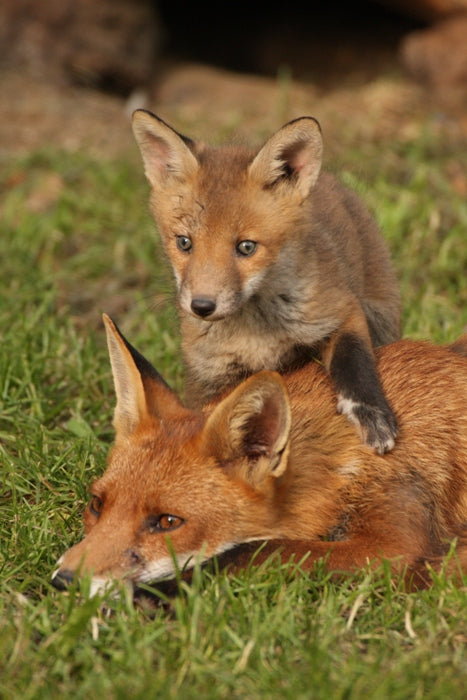
In contrast urban foxes have become startlingly bold. A couple of years ago a friend of mine called to say that his friend’s daughter had fox cubs under a workshop in her garden in Huntingdon, Cambridgeshire. This lady was due to set off on holiday with her family in a few days time. “Can you come tomorrow?” she asked as I spoke to her on the telephone for the first time. In spite of the fact that I had never met her, she decided that I could stay in her house whilst she was away on holiday, which was exceptionally generous-spirited of her. I wouldn’t be studying wild foxes of course, but it would be the next best thing. Town foxes are used to human scent and not as camera shy as their country cousins and so, without hesitating, I left my home and gallery in Thixendale and headed for Huntingdon.
The family lived in a row of terraced houses, with a long thin garden with a shed at the bottom, where the foxes had their den. Ten metres in front of the shed was a wooden Wendy house, belonging to their twin girls. With a cordless saw, I quickly cut out a new ‘window for the girls’ into the end wall of the Wendy house, and settled down to watch the fox family. Throughout the next week, I photographed them from dawn to dusk, spending up to 16 hours a day squashed into a space designed for toddlers. It gave me a fascinating insight into the lives of foxes.

The vixen spent a lot of time grooming her cubs. One day she found a tick inside one of the cub’s ears. She was determined that this tick was coming out, no matter how much fuss the cub made. She pinned the cub down with one paw and nibbled at the tick, occasionally taking a bit of fluff off by mistake. The cub protested much in the same way that my own daughter does when she has her hair brushed. Eventually the tick came out and the vixen loosened her grip on the cub. It retaliated by pulling the vixen’s tail. All the other cubs disappeared for safety under the shed, for fear that they would be the next victim of the ‘nit nurse’. Moments like these would have been so difficult to witness in country foxes.

The vixen’s diet was also much more varied that I expected. She was particularly partial to adult blackbirds, sparrows and collared doves. I was surprised to discover that she was fast enough to catch these flighty birds. In fact she was hunting more like a cat and when, during my stay, I heard the neighbours complaining that a cat was pilfering pet rabbits in the area I suspected the vixen as the more likely culprit. One evening a very fat, black cat sauntered by and looked, with what could only be described as disdain, under the shed at the fox den. No doubt it was sick of getting the blame!
One day, I moved an old fencing panel that was on the ground near the Wendy house and noticed some mice runs underneath it.The vixen quickly cottoned onto them too and soon followed the scent to a nest of pink baby mice. She caught the mice one by one and offered them to her cubs, but I think they were too full of rabbit. So the vixen stashed them, digging a little hole for each mouse and burying it like a squirrel would do with a nut. Later that evening, she excavated the mice and offered them up as supper to the delighted cubs.
Most evenings, when it became too dark to photograph I would unfurl myself from the cramped Wendy house and walk down to the river which was a couple of streets away. Often I would spot the vixen doing her rounds, navigating busy roads and people walking dogs. She knew the territory well and took shortcuts across gardens so that she always beat me home. It was fascinating to discover that she had a routine you could set your clock to.
In that week I saw and learnt more about foxes than in lifetime of watching them in the countryside. Urban foxes have to face up to very different pressures than their country cousins: they need to learn to negotiate busy main roads and have adapted their diets to suit. But, so far, they’ve never have a gun pointed at them.







1 comentario
[…] Now is the best time to see fox cubs as vixens begin to leave them on their own to go out hunting. Fox families will abandon the earths where the cubs were raised but adopt a new area above ground where the cubs now play and are fed. In a few weeks’ time these cubs will be ready to accompany their parents on hunting expeditions. Click here to read more about what I learned during a week I spent watching a vixen and her cubs in … […]